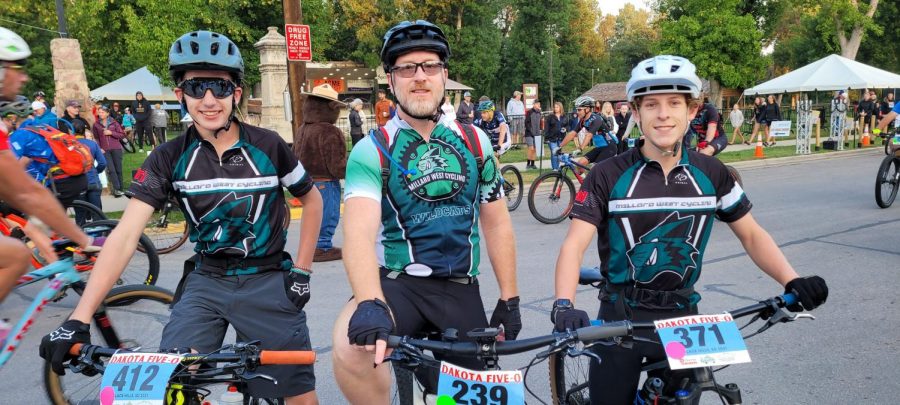A rocky road
Millard West cyclists compete in the Dakota 5-0 race
Ryan Moseley, Jenson Groff and Kieren Langer ride side-by-side during the race. They finished the race faster than they expected. “. My hope is that get to see and experience a large scale mountain bike race, see some awesome trails, and push through to the end,” Moseley said. “They are both strong racers, and I anticipate they will finish well.”
September 10, 2021
Despite the steep and hilly 50-mile course, Millard West head cycling coach and social studies teacher Ryan Moseley and two members of his team were able to complete the Dakota 5-0 race on Saturday, Sept. 4. The race was held in Spearfish, South Dakota, in the middle of the Black Hills.
The event brings in around 1,100 racers from across the country. They are split up into five waves based on their skill level, with the first wave consisting of the professional riders, all the way down to the fifth wave consisting of casual riders. The course has multiple stages, each with its own challenges.
The first 20 minutes of the ride is continuous climbing. After that, as riders spread out within their wave, the congestion lightens. Riders soon enter a loop through the Black Hills, where a majority of the race is held. This year’s race was different than past races because the route was reversed. In the past, racers would start in the Black Hills loop and end at the city park.
“The course was very challenging because of how steep it is,” junior Jenson Groff said. “It is extremely hard to keep your balance while trying to stay on the very narrow path that is about the length of a bike. It was also very hot and hard to stay mentally focused.”
Groff trained rigorously along with Moseley and junior teammate Kieren Langer to prepare for the race. They rode continuously for three hours a day, four times a week in the months leading up to the race. The week before the race, they ate large amounts of carbohydrates so that they could have energy for the race. Despite the intense training, the race was very challenging.
”To prepare physically, distance training was really beneficial along with hill training,” Langer said. “Mentally, the thing is to stay awake and focus on the track ahead.”
Every 12 to 13 miles, the racers could stop at aid stations to rehydrate and eat some food before continuing. Though the aid stations are there to help the riders, riders are encouraged to bring their own water to drink so that they keep hydrated and lower their risk of heat exhaustion.
“The last aid station is known as the Bacon Station, as they hang strips of bacon across the trail,” Moseley said. “Cyclists can grab a few slices as they ride through.”
The racers felt both a sense of accomplishment after the race, and that taught them lessons they will take with them for the rest of their lives.
“I learned that putting in effort to something you love pays off in the long run,” Langer said. “It felt amazing when I finished the race in a decent time, but I was also really worn out physically.”
The trio’s goal was to finish the race and to better the previous time set by Millard West cyclists who participated in the 2016 race. They finished in 6 hours and 13 minutes, more than an hour ahead of the 2016 time. They were among the 700 riders who were able to finish the race.







